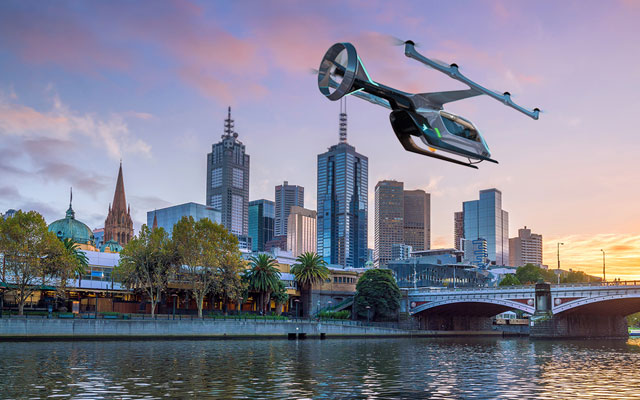
Melbourne will be the first international pilot city for Uber Air, with test flights scheduled to start from 2020 and commercial operations to commence from 2023.
Taking Uber’s tech to the sky, Uber Air aims to open up urban air mobility, and help alleviate transport congestion on the ground. In the long term, Uber’s vision is for electric vehicles to transport tens of thousands of people across cities for the same price as an UberX trip over the same distance.

Susan Anderson, regional general manager for Uber in Australia, New Zealand and North Asia made the announcement at Uber’s global Elevate (Uber Air) Summit in Washington on June 11.
She said: “Since we entered the market in 2012, Australians have embraced Uber wholeheartedly. Today, over 3.8 million Aussies regularly use Uber as a reliable way to get from A to B, and governments across the country have recognised the important role ridesharing plays in the future of transport for our cities.”
“Australian governments have adopted a forward-looking approach to ridesharing and future transport technology. This, coupled with Melbourne’s unique demographic and geospatial factors, and culture of innovation and technology, makes Melbourne the perfect third launch city for Uber Air. We will see other Australian cities following soon after.”
According to Anderson, the state government of Victoria, Australia has been highly supportive of the programme.
Congestion is a growing concern for cities around the world, and Australia is not immune – congestion currently costs Australia US$16.5 billion annually and increasing to around US$30 billion by 2030.
Eric Allison, the global head of Uber Elevate, said: “As major cities grow, the heavy reliance on private car ownership will not be sustainable. Uber Air holds enormous potential to help reduce road congestion. For example, the 19km journey from the CBD to Melbourne airport can take anywhere from 25 minutes to around an hour by car in peak hour but with Uber Air this will take around 10 minutes.”
“Uber’s technology is changing the way people move around their cities – from bikes to pooled rides, we are always looking for ways to reduce the need for private car ownership. In the coming years, with Uber Air, we want to make it possible for people to push a button and get a flight.”
Uber also announced partnerships with leading Australian companies, Macquarie, Telstra and Scentre Group, owner and operator of Westfield in Australia and New Zealand and will work with key existing partners including Melbourne Airport who collectively will support the infrastructure and telecommunications needed to create a successful urban aviation network.
“As the gateway to Melbourne for tens of millions of travellers each year, we can see fantastic potential for Uber Air in the future. We look forward to continuing this exciting conversation, and working with government, regulators and our local communities to make this happen,” said Lorie Argus, chief of parking & ground access at Melbourne Airport.
Andrew Penn, CEO, Telstra added that the company will be working closely with Uber over the next 12 months to assess what network infrastructure, connectivity requirements and other capabilities would be needed to support airspace mobility in urban centres.



















